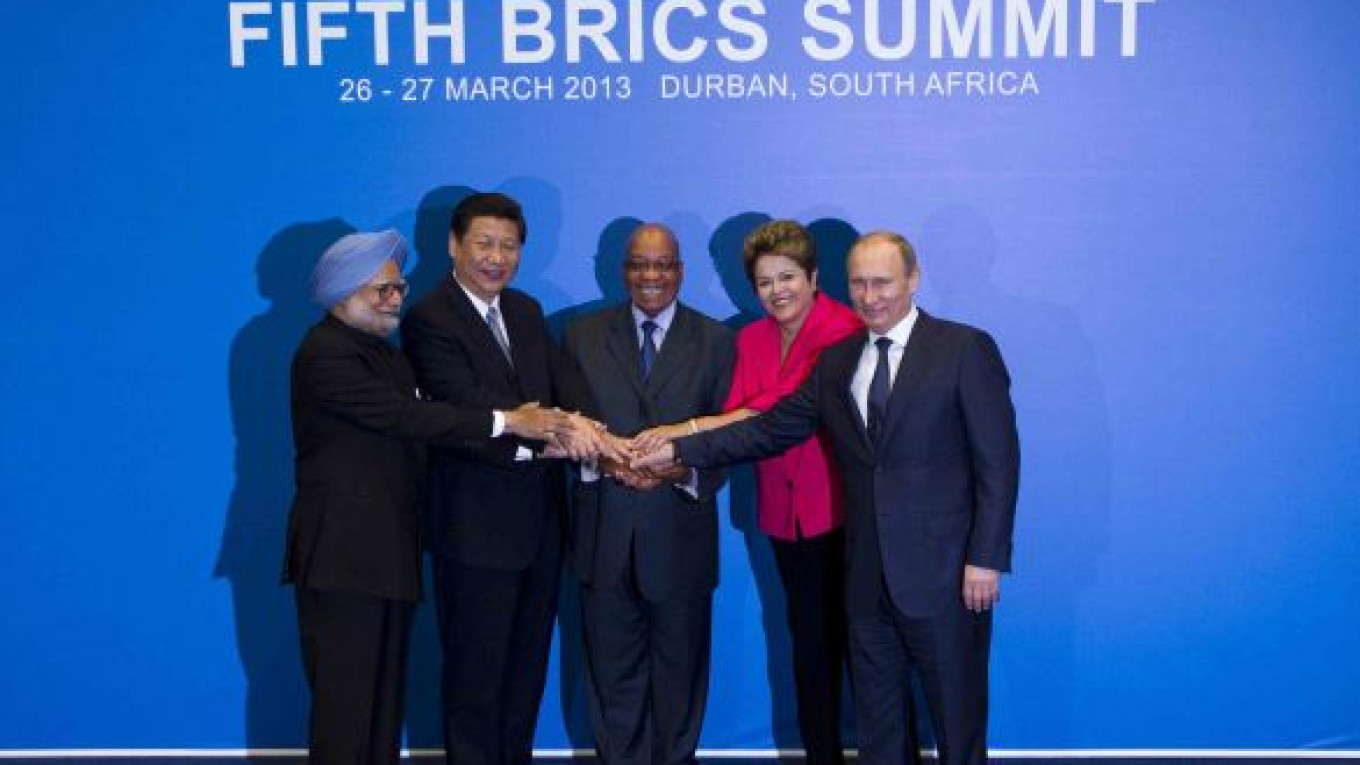Russia and four other major emerging economies on Wednesday agreed to set up a council that seeks to facilitate joint business projects.
But the five countries, known as BRICS, put off the establishment of a joint development bank, saying the move requires more work.
A brief dust-up involving President Vladimir Putin's security detail at one point disrupted the refined ambience of the meetings that the country leaders held in Durban, South Africa.
The BRICS Business Council brings together five representatives from each of the countries — Russia, China, Brazil, India and South Africa — and aims to strengthen trade and investment ties among their business people through technical support and advice.
"Business communities must focus on the search for new opportunities to start multilateral investment projects," President Vladimir Putin said at a BRICS meeting in Durban, South Africa. "The Russian government will provide all possible support to the work of business communities of our countries."
It was Moscow that pushed for the creation of the council, which named South African mining magnate Patrice Motsepe as its chairman. The organization's first session is slated to take place in three to four months, said Russian member Kirill Dmitriyev, director of the Direct Investment Fund.
Russia appointed to the council four other people close to the government. They are Sergei Katyrin, president of the country's Chamber of Commerce; Vladimir Dmitriyev, chief of Vneshekonombank; Vladimir Yakunin, chief of the Russian Railways Company; and Sergei Chemezov, chief of Russian Technologies.
As Putin walked into the Inkosi Albert Luthuli International Convention Center for one of the BRICS gatherings, South African guards cut off his security agents at the entrance in a momentary scuffle caught on television. A bulky, gun-toting and camouflaged man pushed one of the agents — an even beefier figure — in the chest a couple of times.
After a brief argument and a phone call, the Russian security detail retreated and reportedly entered the building at the back door.
Kremlin spokesman Dmitry Peskov blamed the host country for the incident in a Voice of Russia radio news segment. He also joked that "They are better at soccer," referring to the latest soccer World Cup the country hosted in 2010.
On a BRICS development bank, Putin conceded Wednesday that experts had to continue hammering out how it would operate. The new lender would challenge the World Bank, which the BRICS countries accuse of Western bias.
Finance Minister Anton Siluanov said the day before that issues to discuss further included the size of the bank's seed capital, the rules of decision-making, and its location. Each of the five countries would tentatively contribute $2 billion to the bank, he said.
It would be a drastic downsizing of the initial plan under which the bank would manage $50 billion, according to the Associated Press.
A senior member of India's official delegation to Durban, led by Prime Minister Manmohan Singh, offered a sneak peak at the finance ministers' meeting Tuesday where they discussed how they could establish the bank. He said China proposed to cover a part of the contributions of members like Brazil and South Africa, which are more hard pressed financially than others. In fact, China even went to the extent of committing more money further to increase the capital.
"India objected to this, as it would be contrary to the spirit with which BRICS had been raised in the first place — the principle of equality," said the Indian official.
Rajeev Sharma contributed to this report from New Delhi.
Contact the author at medetsky@imedia.ru
Related articles:
A Message from The Moscow Times:
Dear readers,
We are facing unprecedented challenges. Russia's Prosecutor General's Office has designated The Moscow Times as an "undesirable" organization, criminalizing our work and putting our staff at risk of prosecution. This follows our earlier unjust labeling as a "foreign agent."
These actions are direct attempts to silence independent journalism in Russia. The authorities claim our work "discredits the decisions of the Russian leadership." We see things differently: we strive to provide accurate, unbiased reporting on Russia.
We, the journalists of The Moscow Times, refuse to be silenced. But to continue our work, we need your help.
Your support, no matter how small, makes a world of difference. If you can, please support us monthly starting from just $2. It's quick to set up, and every contribution makes a significant impact.
By supporting The Moscow Times, you're defending open, independent journalism in the face of repression. Thank you for standing with us.
Remind me later.


